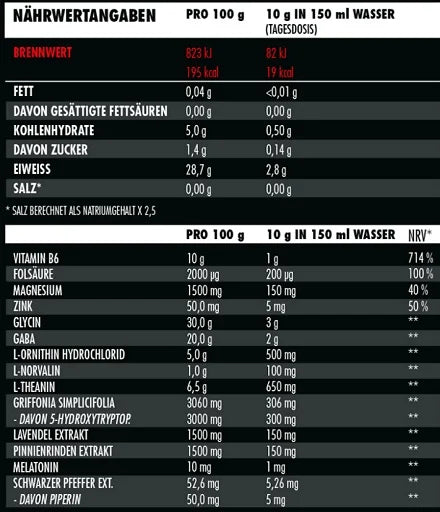Big Zone Rest in Peace Lemon 300g
Big Zone Rest in Peace Lemon 300g
Couldn't load pickup availability
The new Rest in Peace
Our product range has undergone a major makeover in recent months, improving existing products and adding new ones. We haven't shied away from using only the best and most effective ingredients to ensure no compromises in the quality of our products. However, due to the current supply issues across all sectors of the industry, the whole process has taken a little longer than we hoped. Nevertheless, we are proud to present you the new Rest in Peace.
Sleep and recovery are undoubtedly key pillars when it comes to making maximum progress in the gym. However, they rarely receive the attention they deserve. Rest in Peace was designed with the idea of optimizing sleep duration and quality to maximize the nighttime recovery phase. The ingredients are formulated to support each other's effects synergistically.
What exactly is in it?
L-Glycine
Although glycine is the smallest of all amino acids, it can make a significant difference in sleep quality. Scientific studies have observed that glycine itself can act as a neurotransmitter. Even if the body produces sufficient amounts of the amino acid itself, it has been observed that exogenous intake can have an additional impact on the central nervous system.
Some studies found that taking 3 g of glycine before bedtime improved sleep quality and led to a reduction in fatigue and sleepiness the next day. Another study observed that glycine may help regulate body temperature during sleep. Body temperature regulation is an important aspect of sleep quality.
GABA
GABA stands for gamma-aminobutyric acid and is a neurotransmitter primarily responsible for relaxing the nervous system and signaling fatigue. Studies show that primary insomnia in humans is associated with approximately 30% lower GABA levels in the brain.
Unfortunately, when administered orally, GABA has comparatively low bioavailability as a neurotransmitter in the brain. Although the amino acid is absorbed from the intestine into the blood, it is very difficult to transport it across the blood-brain barrier. However, studies suggest that GABA's permeability across the blood-brain barrier can be increased by elevated nitric oxide levels in the blood. Therefore, in Rest in Peace, we have added ornithine, L-norvaline, and pine bark extract to the GABA synergistically to improve bioavailability.
L-Ornithine HCL
Ornithine is an amino acid that, although not incorporated into human proteins, nevertheless plays an important role in the breakdown of ammonia. It is first converted into citrulline and arginine, and can then be converted into nitric oxide (NO). Since NO can increase the bioavailability of GABA in the brain, ornithine may act synergistically with the neurotransmitter used. Furthermore, one study has observed that taking ornithine may promote sleep after strenuous physical exercise.
L-Norvaline
Contrary to what its name suggests, L-norvaline is not an analogue of the amino acid valine, but of isoleucine. L-norvaline is able to inhibit the enzyme arginase, thus reducing the breakdown of arginine in the blood. This makes more arginine available in the blood to be converted into nitric oxide by another enzyme, NO synthase, thus further supporting the bioavailability of GABA.
L-theanine from green tea extract
Studies have shown that the amino acid L-theanine has calming effects without causing drowsiness. Research has also shown that it can reduce the subjective perception of stress and thus also exert significant adaptogenic effects.
In one study, taking 200 mg of L-theanine before bedtime reduced nighttime awakenings and increased sleep efficiency. Another study examining the optimal dosage of various substances for improving sleep concluded, based on experiments and calculations, that 650 mg of L-theanine is the optimal dosage. For this reason, we used this amount in the new Rest in Peace.
Pine bark extract
The main active ingredient in pine bark extract is a series of proanthocyanidins. These have been shown to increase the activity of the enzyme NO synthase, thus enhancing the production of nitric oxide. Thus, pine bark extract represents the final piece of the puzzle in the synergistic combination with GABA, ornithine, and L-norvaline to achieve maximum bioavailability of GABA in the brain.
Griffonia simplicifolia extract
Griffonia simplicifolia is also known as the African black bean. The seeds of the plant contain the amino acid 5-hydroxytryptophan (5-HTP), which is a precursor to serotonin and is formed from tryptophan. Serotonin, in turn, is converted into the sleep hormone melatonin when light intensity decreases. According to studies, the conversion of tryptophan to 5-HTP is the limiting factor in the production of serotonin and melatonin.
Studies on healthy subjects have observed that taking 5-HTP in various doses led to an increase in REM sleep.
Lavender extract
Lavender flowers are rich in essential oils and have been used for thousands of years as aromatherapy to calm the senses. Scientific studies have observed that oral ingestion of the extract may also have a calming and anxiety-relieving effect.
Melatonin
Melatonin is the hormone produced in our brain from serotonin when light intensity decreases, making us sleepy. Studies show that oral intake of melatonin shortens the time it takes to fall asleep and reduces the subjective symptoms of jet lag.
Unlike other hormones, exogenous melatonin intake doesn't lead to a lasting reduction in the body's own production. Therefore, there's no need to worry about not being able to fall asleep if you take melatonin for a while and then stop taking it again.
magnesium
Analyses have shown that sleep disturbances are often associated with magnesium deficiency, and that increasing intake was able to improve the duration and quality of sleep. One possible mechanism for this is that magnesium, according to research, is involved in maintaining levels of the neurotransmitter GABA.
zinc
Zinc levels also appear to correlate with sleep duration. Studies have observed that subjects who took zinc had longer sleep duration, shorter time to fall asleep, and higher sleep efficiency.
Vitamin B6 and Vitamin B9
Rest in Peace is designed not only to provide important neurotransmitters, extracts, and hormones for sleep, but also to support the body's own production. Scientific studies show that vitamin B6 and vitamin B9 act as cofactors in the body's production of melatonin. Vitamin B6 is also a cofactor in the synthesis of GABA.
Black pepper fruit extract
Black pepper, or rather the piperine it contains, is known to promote the bioavailability of various substances. Scientific studies suggest that piperine, among other things, supports the effects of the amino acids and minerals contained in Rest in Peace and could thus contribute to an improved effect.
How should the Rest in Peace be taken?
Rest in Peace should be taken approximately 15 to 30 minutes before bedtime. One serving corresponds to 10 g of powder dissolved in 150 ml of water.
Ingredients
rest in peace
Split




